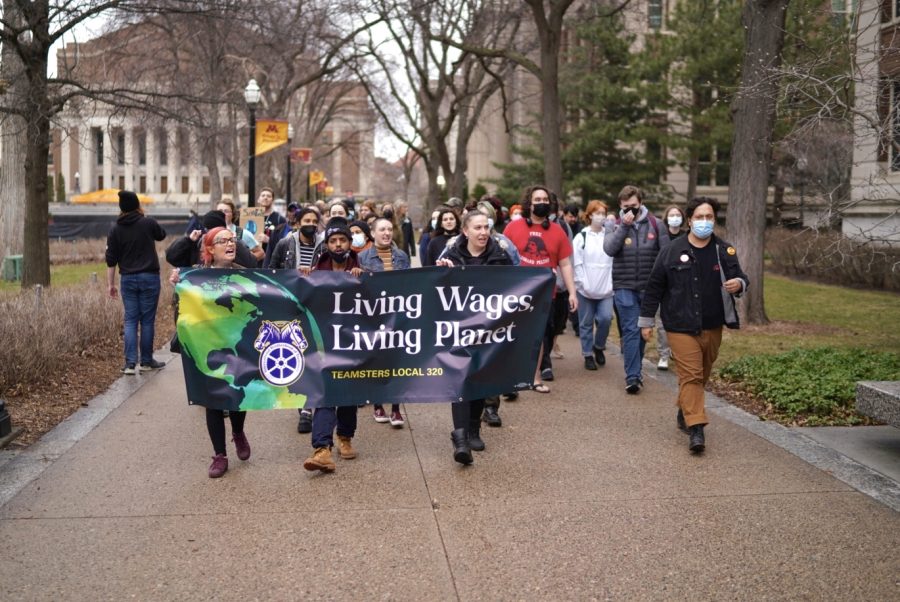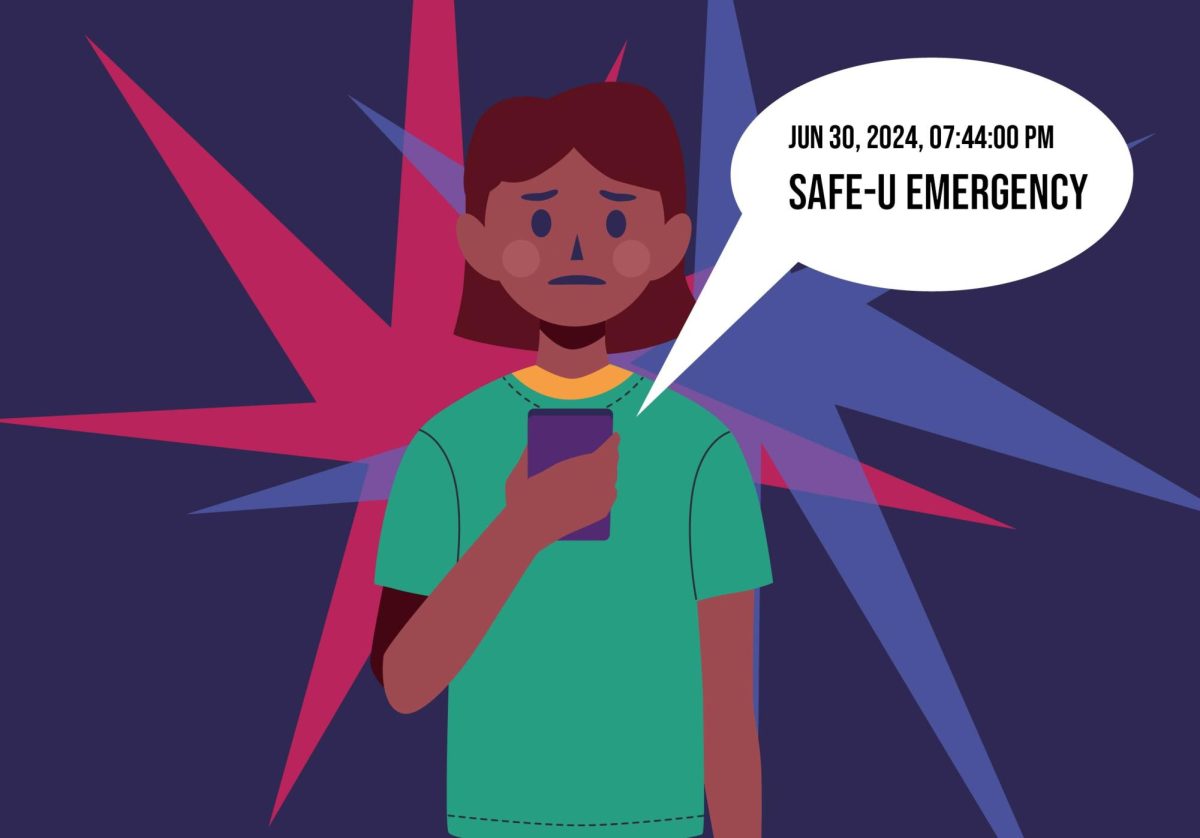As workers from different unions around the University of Minnesota continue negotiations for new contracts, the possibility of strikes has impacted thousands of union workers.
Multiple unions, including nurses and teachers, planned strikes this year to fight for better wages and working conditions while working through a pandemic. While some unions reached new contract agreements, others remain uncertain about future contract negotiations.
Timeline of union strikes
In March, the Minneapolis Federation of Teachers and Educational Support Professionals went on strike for nearly three weeks to fight for wage increases, smaller class sizes and mental health support before voting to approve a contract resolution with Minneapolis Public Schools.
AFSCME Local 3800, which represents around 2,000 clerical, technical and healthcare workers at the University, held a one-day strike in May and are currently engaged in talks for a new contract with the University that includes wage increases and establishes workplace harassment protocols.
Roughly 15,000 members of the Minnesota Nurses Association took to the picket line for three days in September for better wages and work-life balance but have yet to reach a deal with hospital officials.
More than 300 M Health Fairview mental health workers from Service Employees International Union (SEIU) Healthcare Minnesota & Iowa reached an agreement for a new contract with the University on Oct. 4, less than two days before the workers were scheduled to go on strike with mental health workers from Allina Health.
Teamsters 320, which represents roughly 1,500 food service workers at the University, reached a three-year deal with the University on Oct. 24. The agreement prevented a strike that Teamsters members had voted to commence with if they did not reach a deal.
Negotiations
“We want all of our union employees to feel valued and to earn market-rate pay for their work, while we make sound financial decisions on behalf of the University,” said University Vice President for Human Resources Ken Horstman in an Oct. 7 campus-wide email.
Two weeks before reaching an agreement with Teamsters, the University offered workers a deal that included an averaged 5% wage increase with the potential to be more than 7%, according to Horstman’s email. The proposed deal was the highest wage increase the University has offered Teamsters in 26 years.
Despite the proposed increase, the Consumer Price Index, which measures average product price increase over time, measured an 8.2% inflation rate nationwide through September.
In addition to wage increases, contract negotiations are an opportunity for unions to codify new rules and protections for workers. The negotiating team for AFSCME is fighting to make Juneteenth a paid holiday and allow paid leave for workers to vote in tribal elections.
Former Minnesota Gov. Arne Carlson said the reason for workers’ frustrations near the University is the growing disparity between workers fighting for a $20 per hour minimum wage and President Joan Gabel, who signed a contract in 2021 for more than one million dollars.
“The more we squeeze people out of the middle class and lower their standard of living, the more upset they’re going to be,” Carlson said. “What you really don’t have here is the meeting of the minds because there’s a lack of commonality.”
Members behind the union
“I think it’s impossible not to notice that other workers are at their breaking points,” said Eric Immler, a worker for M Health’s Riverside mental health clinic.
Although there was interest among mental health workers to unionize prior to the pandemic, COVID-19 accelerated the movement to unionize in 2021, according to Immler.
Throughout the pandemic, mental health workers were not provided personal protective equipment, did not have clear protocols to protect workers and were required to work after being exposed to COVID-19, Immler said. The pandemic also brought an increased demand for mental health services, giving workers more responsibilities without additional support from the University.
In 2021, the demand for depressive disorder treatment in the United States increased 12% compared to the previous year, according to a survey from the American Psychological Association. Despite many union members’ fear of losing their jobs, Immler said SEIU decided the most effective way to receive support from the University was to strike.
“It’s a lot of work and it’s very scary for workers to think about striking. I think that’s something that’s maybe not talked about as much,” Immler said. “It doesn’t feel like I get to go have a day off and go be with my friends. You’re going to be on the picket line.”
Hours before their planned strike, SEIU reached a tentative agreement with the University on a new contract that included increased paid time off and wage increases. Although Immler said he was “extremely proud” of SEIU’s new deal, he said the University must be “willing to be proactive [and] not just reactive on issues” to prevent potential union strikes in the future.
Workers with AFSCME have not had as successful negotiations with the University.
After months of negotiations, AFSCME signed a one-year deal with the University in January that allowed union members to work from home and gave protections to transgender workers’ rights. The union began bargaining sessions with the University in May for a new contract focused on “raises and respect,” said AFSCME Vice President for Organizing Max Vast.
“Inflation is upwards of 8% right now, and we’ve seen the cost of everything go up,” Vast said. “The University is offering 3.85% wage increases, which for us isn’t enough, and it’s not going to keep up with that at all.”
Mahva Jones is a treasurer and steward for AFSCME’s local chapter. According to Jones, many clerical, technical and healthcare workers also face problems such as microaggressions and bullying.
“The University is not a great place to work overall because of all of the issues,” Jones said. “I happen to work in a department that generally appreciates me and respects me as a human being. That is not a widespread experience for other clerical and tech workers, and especially healthcare workers across the University system.”
Other AFSCME members shared concerns about their current working conditions. Lindsay Knoll said staffing shortages in the University’s Research Animal Resources caused veterinarians to go to work sick. Kim Thomas said a co-worker left her position after being denied a $2 per hour raise. Claudia Velasco said they have not been additionally paid for acting as a translator for their orthodontic patients.
Contract negotiations are ongoing between AFSCME and the University. Although it is a possibility that has been discussed among members, Vast said workers want to come to an agreement with the University and avoid striking.
“Solidarity wins things,” Jones said. “If there’s something that any wise employer should have learned through the pandemic, it’s that people are no longer willing to accept what we lived with before. More people have been waking up to that truth.”





















